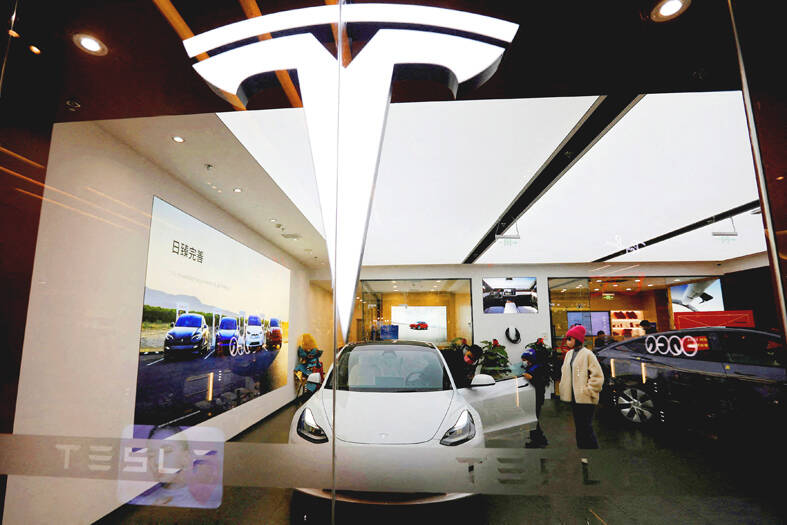Tesla Inc cut prices in China and the US, its two key markets, after disappointing first quarter sales contributed to swelling inventory.
In China, Tesla lowered prices across its range, with the revamped Model 3 falling to 231,900 yuan (US$32,659) from 245,900 yuan previously. The Model Y was discounted to 249,900 yuan from 263,900 yuan.
In the US, the cheapest version of the Model Y is US$42,990, back to the sports utility vehicle’s lowest starting price.

Photo: REUTERS
Tesla also discounted the two other more expensive versions of the Model Y by US$2,000, and dropped the price of the Model X to its lowest yet.
The cuts cap a wild week for the Texas-based automaker, even by Tesla CEO Elon Musk’s standards.
It started when Musk announced in a memo to the company’s more than 140,000 employees that he was reducing headcount by more than 10 percent globally. Two top executives also left.
Tesla is to ask shareholders to vote again on a US$56 billion compensation for Musk that was voided by a Delaware court in January, the company said on Wednesday in its proxy statement.
On Friday, the company recalled almost 3,900 Cybertruck pickup trucks to fix or replace accelerator pedals that could dislodge and cause the vehicle to unintentionally accelerate, increasing the risk of a crash.
Then on Saturday, Musk postponed a planned trip to India, where he was expected to meet with Indian Prime Minister Narendra Modi, saying he had to deal with “heavy obligations” at Tesla.
Tesla is to report its first-quarter earnings tomorrow.
Its stock is down more than 40 percent this year on concern about slumping sales, intensifying competition in China and Musk’s risky plan to go “balls to the wall” on autonomy.
The automaker reported its first year-on-year sales drop since the early days of the COVID-19 pandemic, delivering 386,810 vehicles in the first quarter, well short of analyst estimates.
In China, Tesla’s market share shrank to about 6.7 percent in the fourth quarter of last year, from 10.5 percent in the first three months of the year, Bloomberg calculations based on China Passenger Car Association data showed.
The automaker recently pared back production schedules at its Shanghai factory, Bloomberg said late last month.
Shipments from its Shanghai plant — which makes electric vehicles for China and for export to other parts of Asia, Europe and Canada — declined in the first two months from a year earlier, even as overall passenger vehicle sales in China increased.

Application-specific integrated circuit designer Faraday Technology Corp (智原) yesterday said that although revenue this quarter would decline 30 percent from last quarter, it retained its full-year forecast of revenue growth of 100 percent. The company attributed the quarterly drop to a slowdown in customers’ production of chips using Faraday’s advanced packaging technology. The company is still confident about its revenue growth this year, given its strong “design-win” — or the projects it won to help customers design their chips, Faraday president Steve Wang (王國雍) told an online earnings conference. “The design-win this year is better than we expected. We believe we will win

Intel Corp chief executive officer Lip-Bu Tan (陳立武) is expected to meet with Taiwanese suppliers next month in conjunction with the opening of the Computex Taipei trade show, supply chain sources said on Monday. The visit, the first for Tan to Taiwan since assuming his new post last month, would be aimed at enhancing Intel’s ties with suppliers in Taiwan as he attempts to help turn around the struggling US chipmaker, the sources said. Tan is to hold a banquet to celebrate Intel’s 40-year presence in Taiwan before Computex opens on May 20 and invite dozens of Taiwanese suppliers to exchange views

Chizuko Kimura has become the first female sushi chef in the world to win a Michelin star, fulfilling a promise she made to her dying husband to continue his legacy. The 54-year-old Japanese chef regained the Michelin star her late husband, Shunei Kimura, won three years ago for their Sushi Shunei restaurant in Paris. For Shunei Kimura, the star was a dream come true. However, the joy was short-lived. He died from cancer just three months later in June 2022. He was 65. The following year, the restaurant in the heart of Montmartre lost its star rating. Chizuko Kimura insisted that the new star is still down

While China’s leaders use their economic and political might to fight US President Donald Trump’s trade war “to the end,” its army of social media soldiers are embarking on a more humorous campaign online. Trump’s tariff blitz has seen Washington and Beijing impose eye-watering duties on imports from the other, fanning a standoff between the economic superpowers that has sparked global recession fears and sent markets into a tailspin. Trump says his policy is a response to years of being “ripped off” by other countries and aims to bring manufacturing to the US, forcing companies to employ US workers. However, China’s online warriors